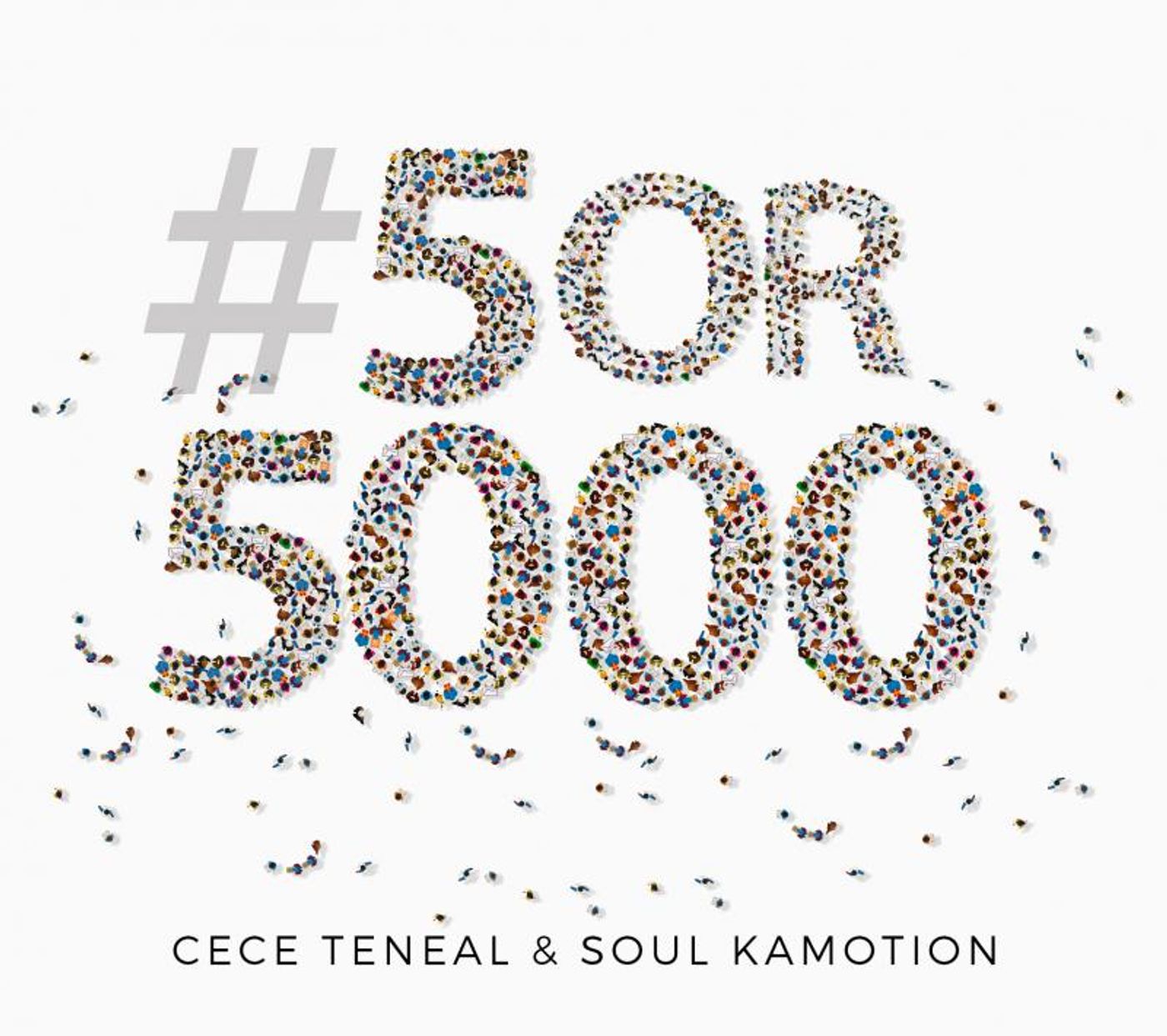CeCe Teneal & Soul Kamotion Release New CD, #5or5000
Eclectic is a word tossed around too much in music. Its definition means to be derived from various sources, and the question follows what one does with them.
Built on familiarity, experience and a combination of musical influence, the Orlando, Florida-based Soul Kamotion has released #5or5000. A recent sit-down with frontwoman CeCe Teneal, along with keyboardist/music director Christopher Baptiste and bassist Terrell Kimble gave off the feeling of excitement and accomplishment. "We have been together for so long," Teneal explains, "so for us to get to this point, and (the album) to be a product of such substance, that's the one thing we're super-proud of, we got the opportunity to do this with people that we love and people that we can see ourselves onstage with night after night."
The significance of the title is a simple one: "We would always say whether there's five people or five thousand people in the audience," Teneal says, "and that just kind of stuck with us for this record. We're gonna give the show of a lifetime, we're gonna lay it all on the line, because every person deserves to get what the message is, they're gonna experience the same thing."
Gospel is at the root of Soul Kamotion's music, but that's only the beginning of the experience #5or5000 brings. "I think that the undercurrent of everything that we do," Teneal goes on, "you can hear the gospel underneath it. Because that's where we draw all our roots from. We're all so eclectic in our musical influences, as we come together as a collective, each of us are so eclectic, imagine five people, multiply that by ten different influences, it molds together so well because of how we are as friends. We kind of table our personal selves (and) the collective shines so bright. You can hear it, you can feel it, you end up leaving with a feeling of how music is, it's supposed to touch people."
The album changes from track to track, but this comes naturally. The opening buzz of "90 Mph" gives way to the soulful "Rockstar," then the funk of "Danger." There too is a step into the blues, with a cover of "What I'd Do to Get Your Love Back," which was recorded by Teneal's mother, Yvonne Jackson, and "I Betcha Come Back."
"Every song draws from a different story or experience or something that God dropped into our spirit that needed to be spread," Teneal says. "The main thing for us is, if one person's life is saved, or if one person changes their perception on how their life is lived or gets them out of a bad situation, then for me that would be the measure of success, being able to change lives."
"And we will gladly accept the Grammy as well," Baptiste adds, which draws a laugh.
Baptiste agrees while there is a formula, "it's a little different, song to song," he says. "This is almost our second album. CeCe had done a studio album, where a couple of these songs were on there. We were already a band, we had the chemistry already, we had the camaraderie already, we could finish each other's sentences."
Some songs were drawn from the band's respective pasts, as Baptiste explains, "(Guitarist) Lavar Rushing had some songs we already had seen, 'Danger,' specifically. The process is where we're comfortable enough to tell each other 'no,' we're comfortable enough to accept that, we listen to each other, we take each other's advice and have so much respect for each other things fall into place. I don't think we plan on changing the process. I like for the record to speak back once we're done."
#5or5000 is the product of all of the above, and the tracks fit together, not as a specific concept album, but the principle seems the same. "'90 Mph' just really sets the tone for the ebbs and flows that will be in the album," Teneal says. "The message is totally what we stand for, but the music gives you a particular drive you can expect to hear throughout the rest of the album. '90 Mph' is basically saying we're music for your body and your soul. A lot of times we'll open our show with that song because it really sets the tone for what to expect during this experience."

"(There are no) album fillers on here," Baptiste feels. "Every song is so powerful. It's like I got to make my favorite kind of music."
As for favorite tracks, Kimble says, "'Lonely (Even When You're Here)' starts off mellow, and then it ends up very intense, and part of the lyrics are 'I'm lonely even when you're here,' so that's pretty deep."
"Mine vacillates between 'Alive,' because 'Alive' is my true story," Teneal explains." It is a song that reminds me every time I hear it, why I'm here, why we need to live, why it's important for me to keep forward and fulfill my purpose. That's my favorite on most days. I still love listening to and singing along with 'What I'd Do to Get Your Love Back.' My mom recorded that song initially, so I've been singing it for (over) 25 years, so it's just one of my all-time favorite songs."
The choice of that song was indeed personal to Teneal. "That is kind of my legacy to her, my tribute to her while she's still alive," she explains, "to record a song from her when she was doing music in the late eighties. One of the other songs was 'Common Ordinary Housewife.' Chris and I were in a writing session one day, and I started singing ('What I'd Do...') and he started playing it before he had even heard her version. While it would be us, it would still pay homage to her as well."
It's an understatement that music is a big part of Soul Kamotion's upbringing. "My grandmother took on a lot of the child-raising responsibility from my mom because she did travel so much," Teneal recalls. "We were never exposed to the rock n' roll lifestyle if you will, I'm sure she undoubtedly lived it. But my grandmother kept us pretty structured, and pretty much just living a very normal life. The main thing I remember is not having her around a lot."
As for her own step into music, Teneal remembers, "Ironically, I said, 'I don't want to do this, I don't want to do this I don't want to leave my children, I don't wanna.' It was a challenge one day; a friend back in 2001 said, 'You know, I want you to sing in this talent show for me for my birthday gift,' and it was as if they ignited a flame in me. So it wasn't like this is my all-time journey to do this forever. I had to be pushed, and it was like, 'A-ha, this is what I'm supposed to be doing!'"
"I feel like (music) chose me," Baptiste says. "I never felt like I had a choice, man. I might have come out of the womb ready to find out what it is. More so for me is how I do music, though. You don't learn to play piano at one year old, but just singing, humming and feeling music and looking around at what it does to a room. I'm in church, and on the way to church, we listen to the radio, on the way home we listen to the radio. My dad is a minister, and my mom was a pretty well-known singer and soloist in Harlem. All my family members play instruments, and everyone sings. I think I finally found my place, but it was never a decision. That was always laid out for me."
"For me, it was growing up with music all around me as well," Kimble says. "My dad was playing the Ohio Players, Kool & the Gang, Earth, Wind, and Fire, this is from when I was a small child. He had the vinyl of all those guys. I was born and raised in the church; we went on Sunday, on Tuesday night, and Mom made us go to choir rehearsal Thursday. My mom and dad, they would buy every gospel artist, Edwin Hawkins, Timothy Wright, and some you've never heard of, that had projects out. They would always purchase these albums to try them out. It was always just drilled in me; I couldn't help but absorb it all, it's always been there in my life. Being in New York," he added, "hip-hop influenced me as well. A lot of hip-hop songs have musical influence as well, translated through the music and it reached me."
Soul Kamotion evolved from an event that turned into one of their own. "In Orlando there was not a huge outlet for artists," Teneal admits. "We were brought on to do an event called Downtown Live, and we quickly transitioned into doing our own event, that was Sunday Night Live. We just played together, and it was fun, it was our outlet from the week. We would have different (musicians), but at its core, it was always a family-oriented music situation. I was riding down the street, and I said, 'Chris we need a name, but it can't be some boring name.'"
The audience is "from 16 to 65," Teneal likes to say. Whatever your taste, Soul Kamotion will cause one. The music is the thing, with solid musicianship and attention to detail. Indie music such as this may not be driving the market, but it makes the scene. One listen is all you'll need.
https://www.facebook.com/soulkamotion/
https://twitter.com/soulkamotion
https://store.cdbaby.com/cd/cecetenealsoulkamotion
https://www.instagram.com/SoulKamotion/
https://twitter.com/ceceteneal
https://www.instagram.com/ceceteneal/
Videos

